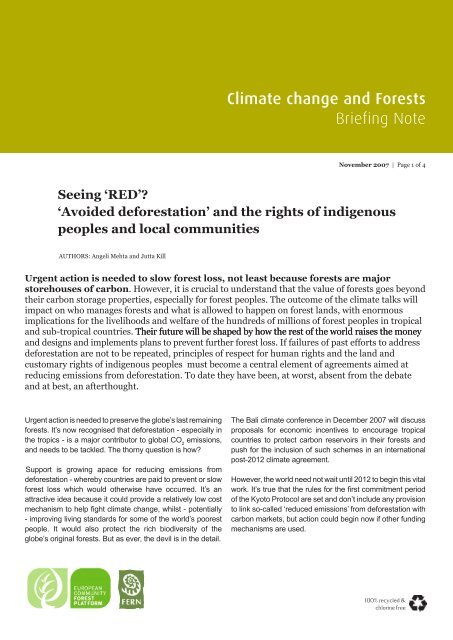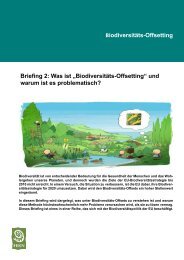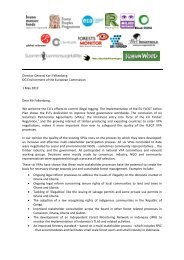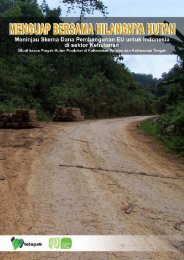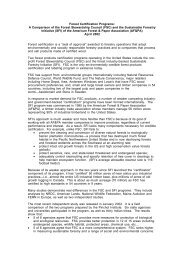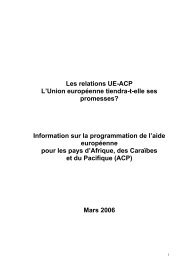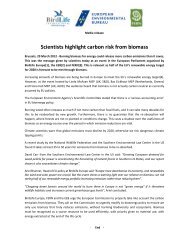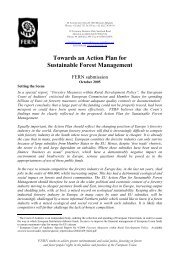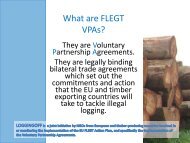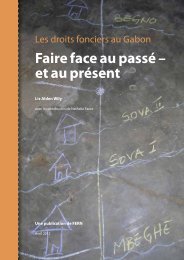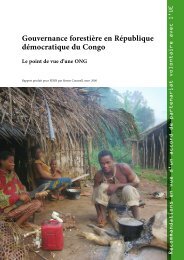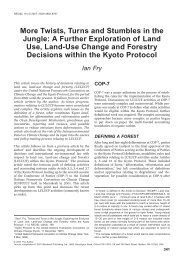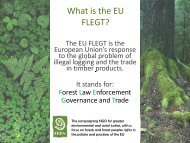OPEN - Fern
OPEN - Fern
OPEN - Fern
You also want an ePaper? Increase the reach of your titles
YUMPU automatically turns print PDFs into web optimized ePapers that Google loves.
November 2007 | Page of 4<br />
Seeing ‘RED’?<br />
‘Avoided deforestation’ and the rights of indigenous<br />
peoples and local communities<br />
AUTHORS: Angeli Mehta and Jutta Kill<br />
Urgent action is needed to slow forest loss, not least because forests are major<br />
storehouses of carbon. However, it is crucial to understand that the value of forests goes beyond<br />
their carbon storage properties, especially for forest peoples. The outcome of the climate talks will<br />
impact on who manages forests and what is allowed to happen on forest lands, with enormous<br />
implications for the livelihoods and welfare of the hundreds of millions of forest peoples in tropical<br />
and sub-tropical countries. Their future will be shaped by how the rest of the world raises the money<br />
and designs and implements plans to prevent further forest loss. If failures of past efforts to address<br />
deforestation are not to be repeated, principles of respect for human rights and the land and<br />
customary rights of indigenous peoples must become a central element of agreements aimed at<br />
reducing emissions from deforestation. To date they have been, at worst, absent from the debate<br />
and at best, an afterthought.<br />
Urgent action is needed to preserve the globe’s last remaining<br />
forests. It’s now recognised that deforestation - especially in<br />
the tropics - is a major contributor to global CO 2 emissions,<br />
and needs to be tackled. The thorny question is how?<br />
Support is growing apace for reducing emissions from<br />
deforestation - whereby countries are paid to prevent or slow<br />
forest loss which would otherwise have occurred. It’s an<br />
attractive idea because it could provide a relatively low cost<br />
mechanism to help fight climate change, whilst - potentially<br />
- improving living standards for some of the world’s poorest<br />
people. It would also protect the rich biodiversity of the<br />
globe’s original forests. But as ever, the devil is in the detail.<br />
The Bali climate conference in December 2007 will discuss<br />
proposals for economic incentives to encourage tropical<br />
countries to protect carbon reservoirs in their forests and<br />
push for the inclusion of such schemes in an international<br />
post-2012 climate agreement.<br />
However, the world need not wait until 2012 to begin this vital<br />
work. It’s true that the rules for the first commitment period<br />
of the Kyoto Protocol are set and don’t include any provision<br />
to link so-called ‘reduced emissions’ from deforestation with<br />
carbon markets, but action could begin now if other funding<br />
mechanisms are used.
Who benefits?<br />
Governments and global agencies are talking in detail about<br />
how to fund reductions in emissions from (tropical) forest<br />
loss. ‘RED’ will be a much-used acronym at the UN climate<br />
conference in Bali. It stands for ‘reducing emissions from<br />
deforestation’, or for ‘reducing emissions from deforestation<br />
and forest degradation’ in the case of REDD.<br />
The main thrust of the proposals on the table, both from<br />
governments and international conservation organisations,<br />
is for Northern industrialised nations to pay Southern<br />
countries to reduce forest clearance within their borders.<br />
They claim that powerful economic incentives are needed<br />
to counter the economic drivers of deforestation (e.g.<br />
conversion to agriculture or for agro-fuel plantations).<br />
Countries that demonstrate verifiable reductions in<br />
deforestation, or maintenance of forest cover, would be paid<br />
compensation through a global and/or regional fund OR<br />
would be allowed to sell carbon credits that permit additional<br />
emissions elsewhere.<br />
Their proposals claim that policies to reduce emissions from<br />
deforestation will bring increased income for some of the<br />
world’s poorest – but how is this to come about?<br />
There’s no clarity here because there is no rigorous<br />
discussion of how to avoid the social risks associated<br />
with carbon forest projects, which have already seen<br />
indigenous peoples and local communities impoverished by<br />
abusive and costly forest protection contracts and evicted<br />
from their lands. For instance: Who will have the right to<br />
negotiate? How can corruption be prevented in what will<br />
be lucrative enterprises? How will indigenous peoples and<br />
local communities be guaranteed the rewards for protecting<br />
forests? How will evictions be prevented and forest peoples’<br />
customary rights and access to forests upheld? Who will<br />
absorb unforeseen costs? What happens if the carbon is<br />
released unexpectedly, for example through forest fire?<br />
These questions need to be answered before governments<br />
start negotiating a post-2012 agreement that includes<br />
forests.<br />
There is also little clarity about which activities and which<br />
actors might receive funds or rewards through measures<br />
to reduce emissions from deforestation. Many NGOs are<br />
concerned that industrial logging operations claiming to<br />
reduce forest degradation, if extra carbon funding were<br />
November 2007 | Page of 4<br />
available, may be rewarded to continue unsustainable<br />
logging practices.<br />
Sir Nicholas Stern, who led the UK Government’s review<br />
of climate change, believes that the key to effective<br />
forest management is “establishing and enforcing clear<br />
property rights to forest lands and determining the rights<br />
and responsibilities of the communities, landowners and<br />
loggers.” This, he says, should involve local communities<br />
and ‘take account of their interests and structures’ (p537).<br />
The World Agro-Forestry Centre claims that environmental<br />
payments schemes can work if proper attention is given to<br />
rights and equity issues. They cite their programme operating<br />
in Indonesia, Nepal and the Philippines called Rewarding<br />
Upland Poor for Environmental Services (Rupes). One<br />
positive example they point to in Sumberjaya, western<br />
Indonesia – where forced evictions were the norm ten years<br />
ago – the government has awarded conditional land tenure<br />
to more than 6000 farmers – which has doubled local land<br />
value, reduced corruption and increased farmers’ incomes.<br />
But more often than not, they don’t. Forest protection<br />
schemes involving carbon trading that have failed to properly<br />
address governance and livelihood concerns have not fared<br />
so well. Evidence from India, Brazil and Ecuador shows how<br />
indigenous peoples often don’t get the levels of income and<br />
employment promised.<br />
Proving clear title to the land is a huge problem for many of<br />
the world’s poorest and the customary land and resource<br />
rights of indigenous peoples are often not recognised by<br />
national laws – so inevitably some schemes have generated<br />
conflict, and inequalities between peoples have got worse.<br />
An independent NGO study of a carbon offset<br />
plantation project in the Ecuadorian Highlands<br />
found that many local people have become worse<br />
off – and even indebted. Non-native pine plantations<br />
were established and ‘offset’ credits sold to<br />
a Dutch carbon consultancy. The money offered<br />
by the scheme has turned out to be less than<br />
expected because costs (e.g. plant and technical<br />
assistance) were deducted from final payments to<br />
communities and because the contracts ascribed<br />
all the risks to the community. The community<br />
had to pay for the replacement of trees destroyed<br />
by accidental fire – a cost they never previously<br />
incurred.
In the Noel Kempff National Park in Bolivia - where a<br />
consortium bought out logging concession owners in<br />
order to extend the park - the costs of forest protection fell<br />
disproportionately on the local populations. People faced<br />
restrictions on hunting, fishing etc; public roads deteriorated<br />
after the termination of the logging concessions, so transport<br />
costs for local communities increased.<br />
Local NGOs who assessed a World Bank financed,<br />
so-called ‘community forest management’ project<br />
in Andhra Pradesh in India, found increased state<br />
control over forests to the exclusion of local people.<br />
Those who dared to question decisions made<br />
by the Indian forest department were threatened<br />
with legal action. Much of the funding received<br />
from the World Bank on behalf of the local people<br />
hasn’t actually reached the villagers pockets.<br />
Many Adivasi families, who lost their shifting<br />
cultivation fields, have had their land -for- land<br />
compensation claims rejected, and now find<br />
themselves dependent on wages for seasonal work<br />
that is very hard to come by.<br />
Some advocates of avoided deforestation programmes point<br />
out that there are emerging certification standards which<br />
provide safeguards for new avoided deforestation schemes.<br />
However, it has become clear that often those voluntary<br />
‘standards’ simply are not enforced. Take the example<br />
of the logging and tree plantation sectors. The Forest<br />
Stewardship Council’s standards, which are supposed to<br />
respect indigenous land tenure and uphold the principle of<br />
free, prior and informed consent, have been found lacking<br />
in some countries, including several that are now the focus<br />
of the ‘Avoided Deforestation’ debate. It’s worth pointing<br />
out that the Ecuadorian pine plantations project (see box<br />
above) - for all its problems – won FSC certification.<br />
Funding: the how?<br />
The Brazilian government has proposed that there should<br />
be an international fund to compensate efforts to reduce<br />
emissions from deforestation. Sir Nicholas Stern suggests<br />
such an approach could provide for the setting up of<br />
targeted pilot schemes - to get practical experience. This<br />
may be a good idea - depending on how the public funds<br />
are administered.<br />
November 2007 | Page of 4<br />
The World Bank is putting avoided deforestation at the<br />
forefront of its proposals for a new Global Forest Partnership.<br />
The Forest Carbon Partnership Facility, which the Bank plans<br />
to launch at the UN climate conference in Bali in December<br />
2007, links this ‘mega-fund’ for forests to carbon trading.<br />
World Bank documents describing this carbon partnership<br />
facility define in great detail the rights of buyers and sellers<br />
yet remain surprisingly vague on what exactly is being<br />
bought and sold. Essentially, Southern countries would, in<br />
compensation for reducing deforestation, sell the carbon<br />
locked up in their forests. But whether these payments will<br />
allow the Northern industrialised nations or corporate buyers<br />
of forest carbon to continue polluting as usual in return for<br />
their purchase the World Bank, documents do not reveal.<br />
A group of originally eight countries, called the Coalition of<br />
Rainforest Nations, and many conservation NGOs believe a<br />
scheme based on the carbon market is the only way to raise<br />
the amount of money that would be needed for sufficiently<br />
attractive levels of compensation.<br />
How much will reducing emissions from deforestation<br />
cost? Estimates vary enormously: from<br />
between $5 billion a year to $100 billion a year,<br />
but they all assess cost from the perspective of<br />
commercial land use, not subsistence use by forest<br />
peoples whose livelihoods are often threatened<br />
by deforestation.<br />
According to research commissioned by the Stern<br />
Review, eight countries are responsible for 70% of<br />
emissions from land use change. It estimates that<br />
the opportunity cost of income from alternative<br />
land uses would be around $5bn annually- if deforestation<br />
were to stop. Others believe this figure<br />
is much too low.<br />
World Bank economists estimate that to reduce<br />
the annual rate of deforestation in developing<br />
countries by 20%. ‘Avoided Deforestation’ would<br />
cost between $2bn and $20bn each year - which<br />
suggests that halting it could cost as much as a<br />
$100bn a year.<br />
We disagree. The uncomfortable fact is that, so far,<br />
carbon trading schemes (like the Kyoto Protocol’s Clean<br />
Development Mechanism) haven’t reduced greenhouse gas<br />
emissions, nor have they provided sustainable development<br />
benefits to communities in the Southern nations selling the<br />
credits.
Carbon trading schemes also allow ‘business as usual’ for<br />
Northern polluters with continued reliance on fossil fuels,<br />
and provide no encouragement to change patterns of<br />
conspicuous consumption.<br />
Moreover, it’s impossible to verify how much carbon is<br />
actually being saved - if any. The principle of the Kyoto<br />
Protocol’s Clean Development Mechanism is that carbon<br />
credits should fund projects that would not otherwise<br />
have gone ahead – in many cases this has proved to be<br />
nonsense.<br />
Worryingly, the momentum for a carbon-trading approach<br />
is shifting the debate away from how to promote a just<br />
transition from dependence on fossil fuels through public<br />
investment, regulation, shifting of subsidies, and taxation.<br />
Some critics of the World Bank’s Carbon Partnership<br />
Facility proposal believe that the Bank is trying to harness<br />
avoided deforestation funds to finance its controversial<br />
Forest Strategy, a review of which is imminent and said to<br />
reveal major shortcomings of the Bank’s implementation of<br />
this strategy.<br />
Certainly in its many negotiations with Southern country<br />
governments, the World Bank has so far failed to engage<br />
forest peoples and local communities and its latest<br />
proposals to create a Forest Carbon Partnership Facility<br />
have seemingly had little, and only last minute, input even<br />
from Southern governments, which doesn’t augur well for<br />
their success.<br />
What’s being discussed and negotiated now will have an<br />
impact on who manages forests and what is allowed to<br />
happen on forest land, with enormous implications for the<br />
livelihoods and welfare of the hundreds of millions of forest<br />
peoples in tropical and sub-tropical countries.<br />
Their future will be shaped by how the rest of the world<br />
raises the money and designs and implements plans to<br />
prevent further forest loss.<br />
It is therefore essential that any agreement aimed at reducing<br />
the emissions from deforestation in the context of the climate<br />
negotiations must adhere to the principles of respect for<br />
human and customary rights of forests peoples. Land rights,<br />
customary rights and the free, prior and informed consent<br />
of forest peoples who live in, and depend on, the world’s<br />
forests will have to become central issues in the debate.<br />
One crucial lesson from the many failed initiatives to slow<br />
deforestation is that forest peoples and local communities<br />
must be fully involved in the debate from the beginning.<br />
Sadly, that lesson has yet to be learned by those tabling<br />
proposals and launching carbon partnership facilities to<br />
reduce emission from deforestation at the Bali climate<br />
conference.<br />
Further reading:<br />
November 2007 | Page 4 of 4<br />
This Briefing Note is an abridged update of “Seeing Red:<br />
‘Avoided deforestation’ and the rights of indigenous peoples<br />
and local communities.“ Tom Griffiths, Forest Peoples<br />
Programme, June 2007. Please refer to the original report<br />
for references and bibliography. www.forestpeoples.org<br />
Carbon Trading. Critical Conversation on Climate Change,<br />
Privatisation and Power. Larry Lohmann (ed.), November<br />
2006. www.thecornerhouse.org.uk/climate<br />
The Stern Review on Climate Change: http://www.<br />
hm-treasury.gov.uk/media/9/5/Chapter_25_Reversing_<br />
Emissions_from_Land_Use_Change.pdf<br />
Published by FERN, the campaigning NGO for greater environmental and social justice, with a focus on<br />
forests and forest people’s rights in the policies and practices of the EU.<br />
C Fosseway Business Centre<br />
Stratford Road<br />
Moreton-in-Marsh, Gloucestershire<br />
GL56 9NQ UK<br />
t +44 (0) 608 65 895<br />
f +44 (0) 608 65 878<br />
4, Avenue de l’Yser<br />
B- 040 Brussels<br />
Belgium<br />
t + (0) 7 5 500<br />
f + (0) 7 6 8054<br />
e jutta@fern.org<br />
For more briefing notes visit<br />
www.fern.org<br />
www.sinkswatch.org<br />
This publication was made possible with support from ICCO, Interchurch Organisation for Development Cooperation, and DG Environment<br />
of the European Commission. The views expressed in this briefing are solely those of FERN.


